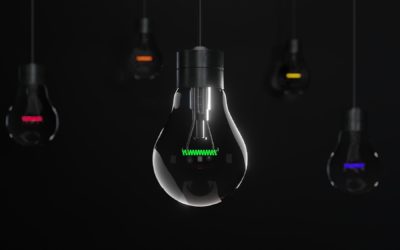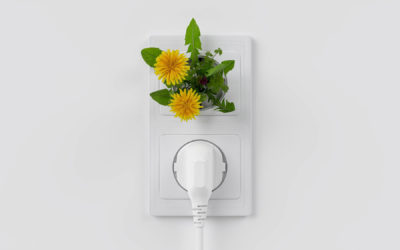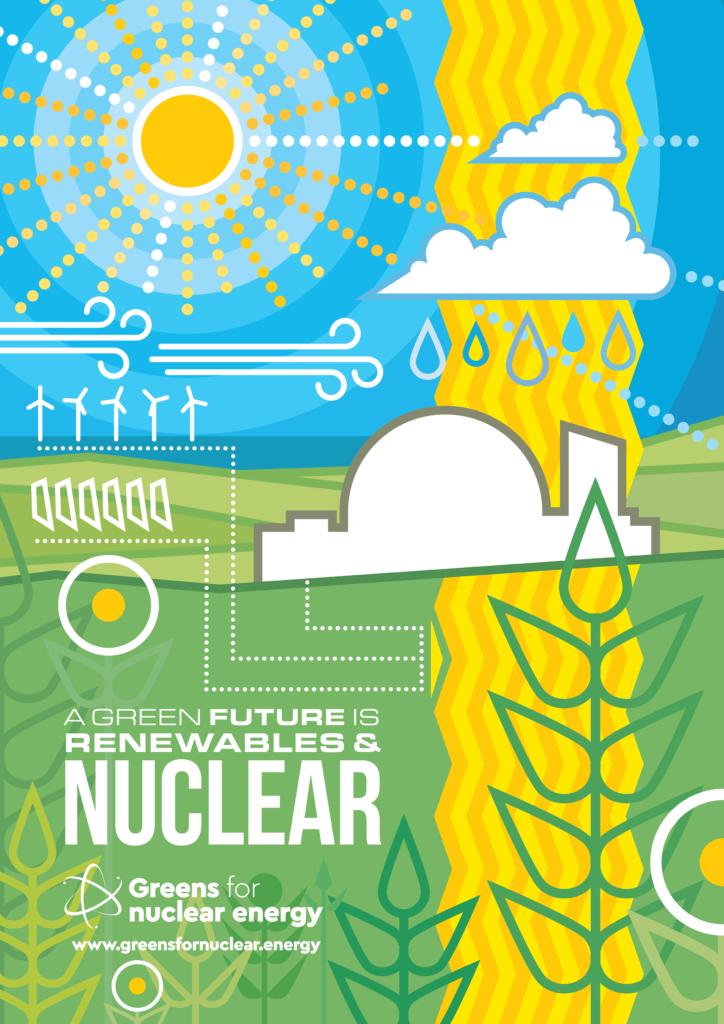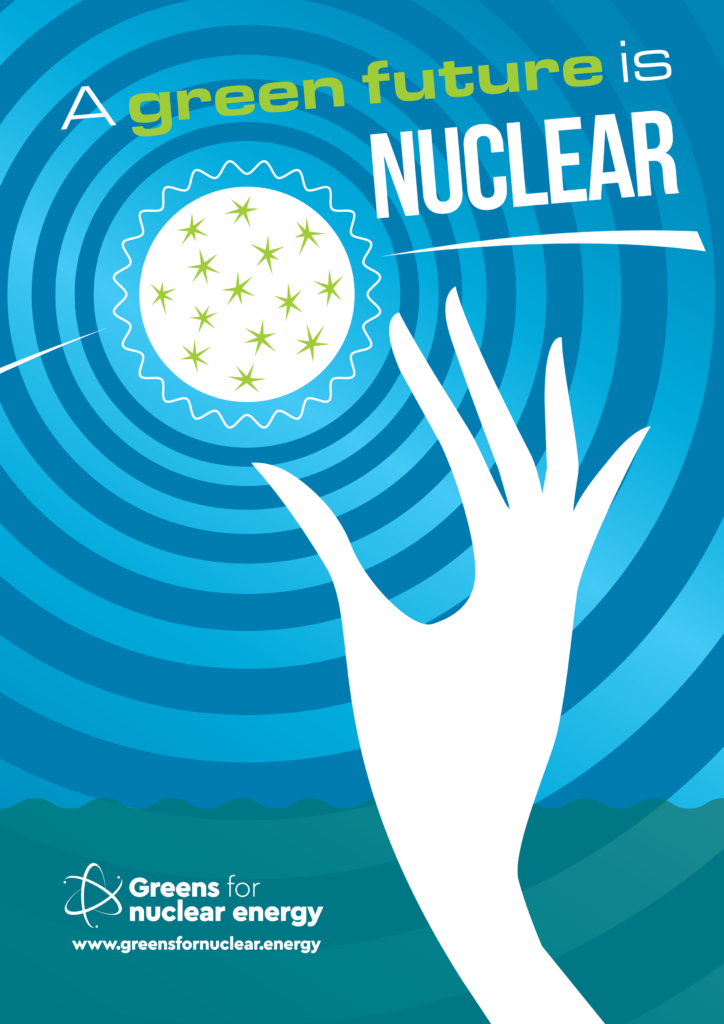No compromise to combat climate change
A Green Party Nuclear Energy Policy fit for the 21st Century
Greens For Nuclear Energy seek to influence the Green movement’s key organisations and institutions to favour nuclear energy. We need every available low carbon power source to combat catastrophic climate change. Our first campaign is to change the Green Party’s policy (England & Wales), which is currently:
EN014: Nuclear power, coal and incineration of waste will be phased out
We believe that the increasingly urgent need to deal decisively with our emerging climate crisis makes continued opposition to nuclear energy irrational for environmentalists and reduces our chances of averting a climate catastrophe.
We therefore oppose the early decommissioning of existing nuclear reactors, unless it can be shown that continued use of any given plant is a present threat to human life, the environment or property.
We support the research and development of new advanced nuclear power technologies and the continued use of existing nuclear power plants until each power plant reaches end-of-life.
We are pro-renewables and strongly advocate for their deployment where topography, geography and climate permit, where a positive local environmental case is made and where there is no consequent reliance on the burning of Fossil Fuels.
We therefore respectfully urge our fellow Green Party members to approach the nuclear power debate with an open mind and not fall victim to the ‘easy way out’ of dogmatic, hard-wired anti-nuclear ideology.
Our aim is to advocate for and promote clean, safe, reliable nuclear power within the party until we reach critical mass and succeed in bringing a motion at conference to amend Green Party clause EN014, to adopt nuclear power as part of an ambitious new Green Party clean energy policy that is fit for the 21st Century.
'CRITICAL'
Watch the new film
How it begins…
There are a wide variety of opinions on Nuclear Energy in the Green Party.
Many members remain strongly ‘anti-nuclear’ and many are simply unsure – not equipped with enough information to feel they can make a decision that they’d be willing to stick their necks out for. An increasing number though are reconsidering their position – most particularly in the context of the sheer magnitude of our Climate Crisis. These are members who recognise the contribution that Nuclear Energy can make – alongside renewables – to rapidly reducing our carbon emissions from not only electricity generation, but across a wide range of sectors.
Some of us are firmly and unequivocally in favour. Some of us say yes – perhaps even through gritted teeth – simply because we recognise that there can be NO compromise to combat climate change. Others are on the fence but becoming simply #NuclearCurious
Follow us on social media
What the scientists say…
Professor Gerry Thomas – Imperial College London
I can understand that people may be nervous about nuclear power. I was too, until I started working on the health effects of the Chernobyl accident. Now, 35 years later, we can say that the only health effect caused directly by exposure of the population leaving near the site of the Chernobyl accident has been an increase in thyroid cancer in those who were children at the time of the...
Kerry A. Emanuel
As a climate scientist who daily confronts the unacceptable risks associated with anthropogenic climate change, I believe the welfare of civilization depends on the rapid development and deployment of economical, carbon-free energy, perhaps supplemented by carbon capture technologies. It is important to understand that this is not merely a question of decarbonizing existing energy...
James Hansen, PhD & Pushker Kharecha, PhD
As concerned climate scientists, we have published and lectured extensively on the scale and urgency of the human-caused climate crisis and the remedies needed for it. One key finding from our work is that the world will need all available non-fossil energy sources -- nuclear energy as well as renewables -- to be scaled up during the next few decades as fossil fuel emissions are...
Francois-Marie Breon
Climate change is now on us and there is a very urgent need to take actions to stabilize the warming to an acceptable level. The 1.5° target that was set 5 years ago during the Paris conference is probably out of reach, and the same fate is likely for the 2° target given our incapacity to take the right measures.About 20 years ago, during the Earth summit conference at Johannesburg,...
Opinion on Nuclear Energy from members of the Green Party
Articles
Present day and soon to come
Present Day 1. The UK Currently only one generation III nuclear reactor is under construction in the UK, at Hinkley Point C. Construction was started in December 2018 and EDF plan to start generating electricity from one of the 2 reactors (each of 1.6GW capacity) by...
Biomass
Biomass is a big topic, with a little name. It means many different things to many different people. Consequently, there is a wide variation in how to measure it - which is why you will see shaded areas of variability on bar charts which include it. Therefore, we need...
A political history
Introduction The first nuclear power stations were developed in the 1950s. Since then, hundreds of nuclear power stations throughout the world have generated low carbon electricity, reliably, safely and with capacity factors (these are explained below) increasing from...
Why Nuclear Energy?
Nuclear power has an important role to play in helping the UK and world achieve net-zero CO2 emissions by 2050. All main political parties, including the Green Party of England and Wales, include some level of nuclear power when stating in their manifestos how they...
The Science
The science bit: An introduction to atomic structure and nuclear reactions The atom consists of a nucleus and electrons in orbits surrounding the nucleus. The tiny electrons are packets of energy with a negative charge whereas the nucleus consists of two particles...
Physical Footprint comparison
Physical Footprint comparison: nuclear, solar & wind The power density for nuclear is about 1000W/m2 compared with 2-3 W/m2 for wind and 100 W/m2 for solar (data taken from here). If the differences in capacity factors are taken into account these values suggest...
Nuclear Fears
Radiation Radiation is ubiquitous. We are all constantly exposed to varying levels of ionizing radiation. It comes from natural radon gas (from decaying natural uranium in the ground), cosmic radiation (from the interaction between photons & alpha particles from...
Increased Capacity
Nuclear Lifetime Extensions and Uprating Plant lifetime extensions and retirements Most nuclear power plants originally had a nominal design operating lifetime of 25 to 40 years, but engineering assessments have established that many can operate longer. By the end of...
Resources
We have commissioned some posterdesigns, if you would like to, you can download and print them or use them on a T-shirt, mugs, anything you like. Please feel free, you could even send us a photo on Twitter!
The files are a vector PDF which is good for printing to nearly any size. The PNG is suitable up to A4.












